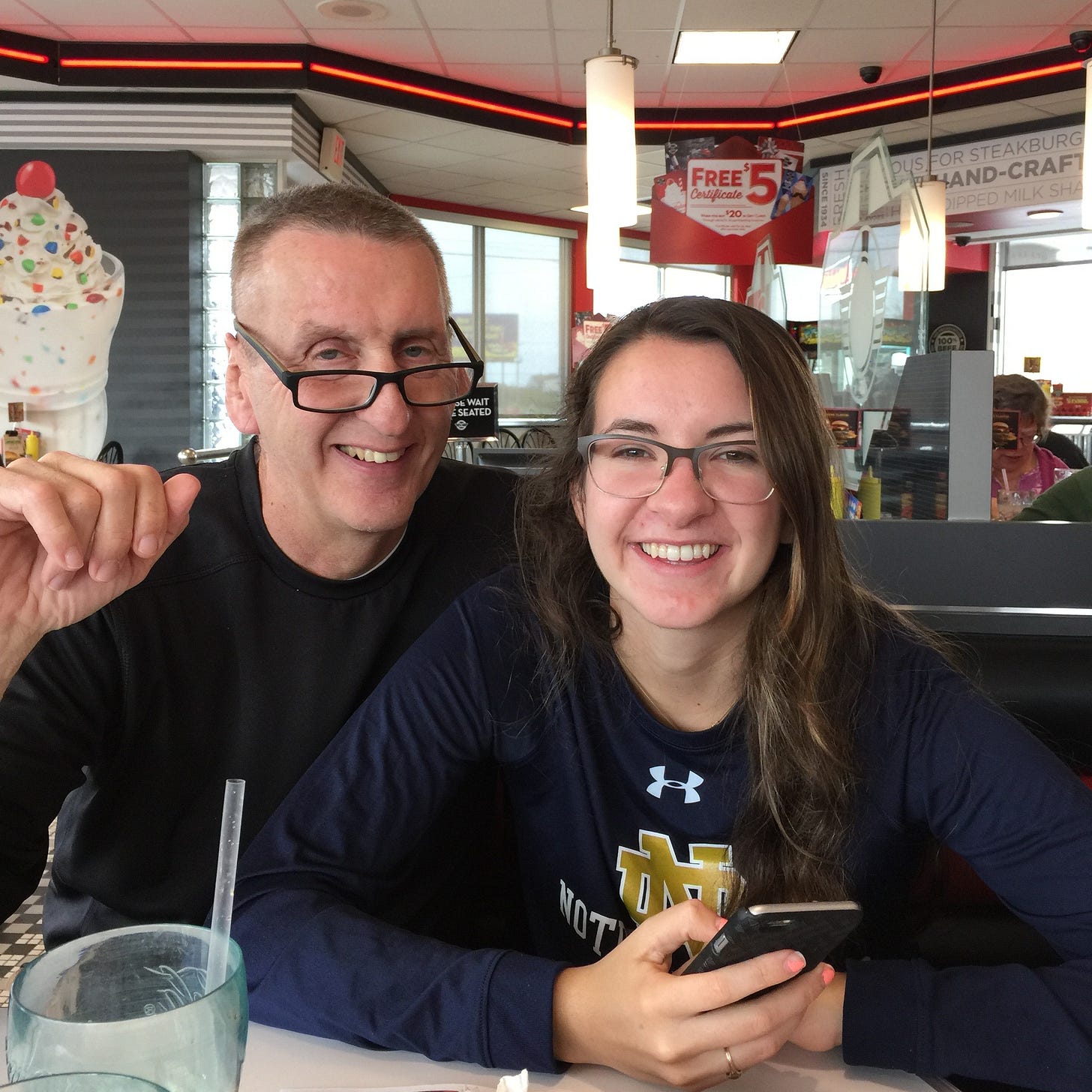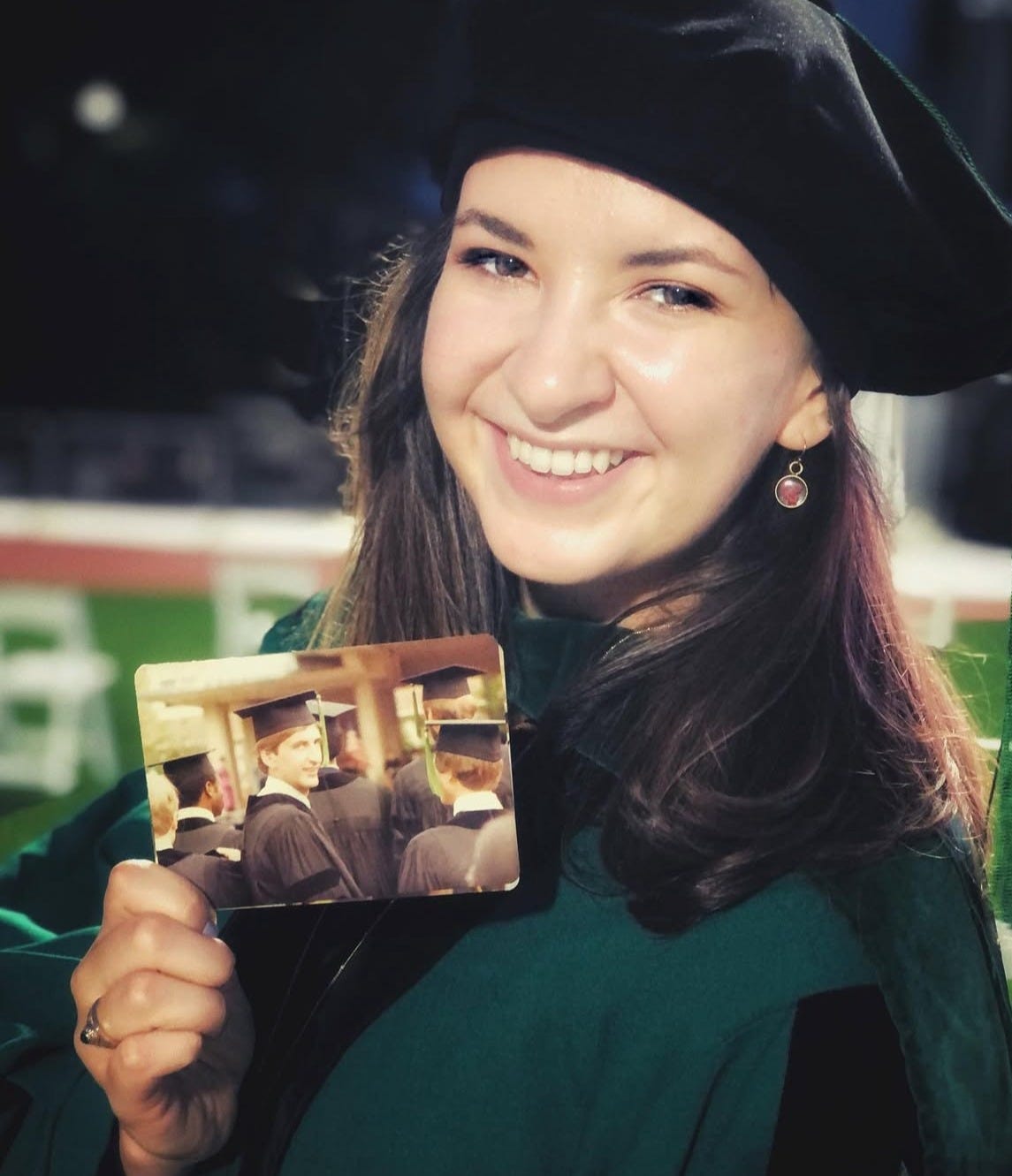Sometimes, We Don't Know The Root Cause.
On being a patient's daughter for a terminal illness while practicing medicine during the MAHA era.
Sitting with my two best friends at our usual table, we are surrounded by the smell of hazelnut coffee and peals of easy laughter. Our mountain of breakfast food arrives, and my best friend looks down at her plate of sunny-side up eggs, raspberry jam toast, and crispy, fried bacon and laughs, saying, “I’m just so glad I started eating again.”
As I sit at my desk now, it is not difficult to be reminded of some of the very best aspects of being a person in this world: a fresh cup of coffee, the lush green of the fan of leaves waving outside the window, the tenor of a familiar, friendly voice. If going through psychiatry residency over the last four years has affirmed any part of my prior notions of the world, it is that the magic of our days go largely unnoticed until they are inexplicably gone, and nothing takes them away with the same brisk cruelty of illness. To go into psychiatry is to join a field that seeks to give the possibility of these moments back. To go into primary care, preventative medicine, and frankly, even to go into more procedural-based care is to value these things when done well.
Four years ago, I was graduating medical school about 1 year into a pandemic. It was a time where acutely, the public at first trusted and lauded our “healthcare heroes,” and the relief of a vaccine had emerged. At that time, concern was less about the bubbling mistrust in healthcare that was emerging in the public, but the mistrust of the healthcare workforce of having a sustainable life in American healthcare. Nurses were leaving the bedside, as the level of risk, hours on the job, and lack of backup support from institutions they worked in made their work untenable. A movement unheard of in US medicine was beginning to sweep across residencies, as the residents who had remained underpaid and under-protected in academic medicine began to feel the limits of doing care for the love of the vocation. As hospital systems tried to deal with the insurance and payer-model systems that value and reimburse most for procedure-oriented care, private equity swept in an bought out care systems.
Personally, I was deep in a complicated sort of grief and medical anxiety—my father was getting treatment for a specific type of brain cancer known to be aggressive and largely terminal within a span of months. The illness and the treatments themselves happen at the level of the brain, and thus it is common in glioblastoma patients to experience personality, memory, or emotional change. There are emerging better treatments in the field of glioblastoma, but it is a diagnosis that is still thought of as a quick death sentence. My father has, fortunately, been a rare statistical outlier. Suffice it to say, at that time, I was 26, starting a psychiatry residency, and unsure of what my family and my dad, my role model in medicine, might go through in the coming years. My own trust in medicine wasn’t exactly the highest—not because I had some sense that the neurosurgeons weren’t trying, or that there were some unknown secrets being held back from the public to have knowledge of. It was much simpler than that—my father was very sick with an illness science, alternative medicine, and spiritual approaches (I tried) didn’t have a solution for.
We would have to wait. We would have to stick together. We would have to grieve.

As a psychiatrist now, especially as one who works in perinatal mental health and starts my child and adolescent fellowship this July, I face every day with my patients this painful spot. The depression is deep and dark, and we’ve tried many medications and therapies and holistic approaches, and still they are suffering. A mother has a child who has had a psychotic break, and diagnostically it seems that schizophrenia is possible, and the idea of the future is uncertain, just as it was for my family with my father. A 20 year old girl has been in and out of intensive levels of care for anorexia, and she feels ripped apart by the pain she feels each day, by her desire and her difficulty with her body and eating, and medications and comprehensive care have helped, but not yet enough.
To work in healthcare is to know grief. It is to know illness, unremitting and breaking against the prime of a life, interrupting. To work in healthcare well is to ask how we can be with our patients as much as how we can help them. There is a reason that part of learning medical ethics is understanding when our desire to be useful can go to an extent that it harms our patients—to seek use of medications, treatments, procedures that don’t have a clinically significant chance of helping or that have risks that will harm them more than the possible good. To be a good doctor often means to see, helplessly, your own impotence, and to not take that out on the patient and those you work with.
This is not what our current nominee for surgeon general would have you believe. Casey Means, MD, has stated that healthcare largely does not value the “root cause” or “prevention.” She has felt that connections between organ systems and symptoms, interactions with environment, or social determinants of health were not taught to her in her medical school training or residency training (which she did not complete), and at present in 2025 are not valued. She has damned the medical system with sweeping statements about what physicians care about, and that it is not prevention. She discredits the medical system without advocating for the fixes that would help increase access to care, reduce burnout among healthcare workers, and advance the science that makes truly improved care possible.
In other words, she does not face what we (as a community of scientists, public health educators, clinicians) know and what we do not know. There are many ways she could have used her experience in medical school and residency for good. Leaving medicine is not the problem. Asking why healthcare doesn’t hear and hasn’t heard particular populations of people is not the problem. Saying our care model needs to be different is not why the medical community takes issue with her nomination.
Implying that modern medicine is full of villains who cannot be trusted to be with people in their difficult, grief-filled moments is the problem. Selling products that do not have adequate science and implementation approaches behind them is the problem. Capitalizing on vulnerable populations and lack of access to care is the problem. When consuming wellness information here or other places online, I invite you to consider what I had to learn as a patient’s child who didn’t want her dad to be sick—care on purpose, read about the illness, but trust clinicians. There are bad eggs out there, but there are many, many good people in the healthcare system that have chosen to spend their life being with people and their families in the hardest moments. I have experienced these types of people, and I hope to be one. My dad was one, and he has benefited from them.

Medicine is difficult work. It is work I am deeply glad to be doing. It is a beautiful thing to think you might love something and find you love it even more than predicted, and that has very fortunately been my experience of psychiatry residency. I am glad to be in the field, and to know the people who have done it for decades, despite the very real imperfect, unethical parts of healthcare we need to fix, together with out patients and our colleagues.
Take care,
Margaret of Bad Art Every Day



“Care on purpose” — YES!